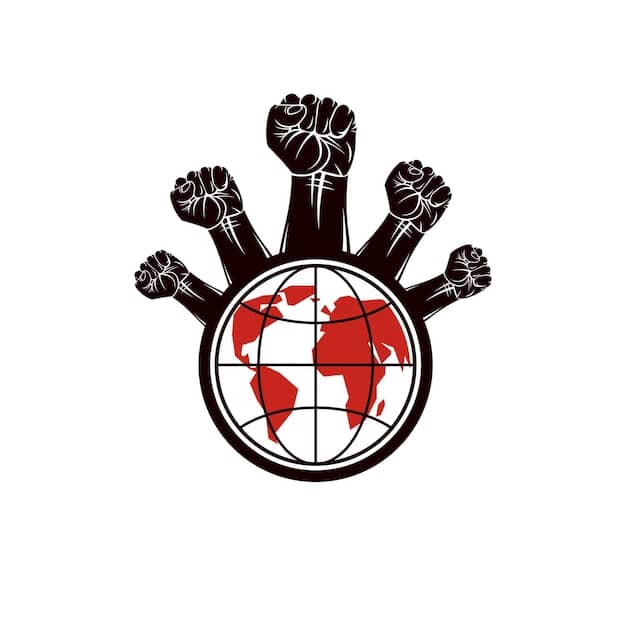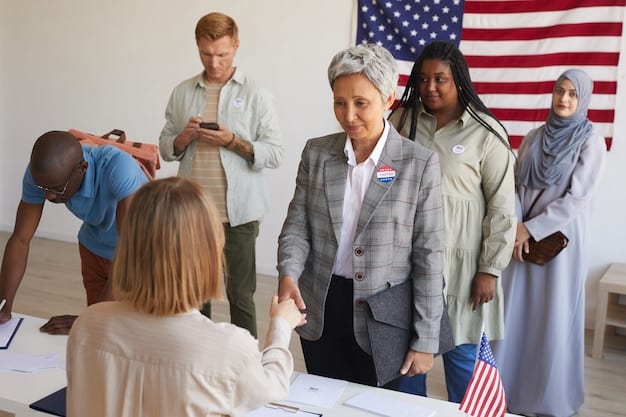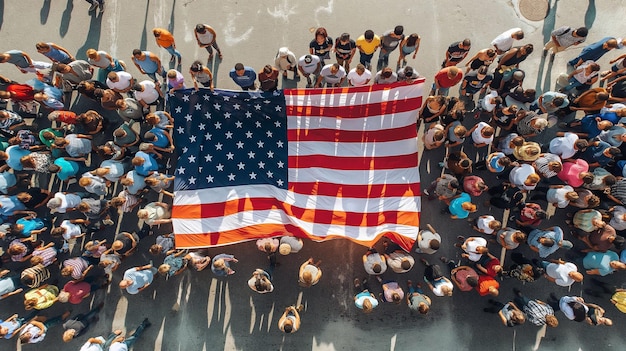US Human Rights: Advocacy, Enforcement, Double Standards Explained

Advertisements
The United States’ position on human rights is characterized by a complex interplay of strong advocacy for universal principles, varied approaches to enforcement, and persistent accusations of double standards, reflecting a nuanced and often contradictory foreign policy.
Understanding the US position on human rights: advocacy, enforcement, and double standards is a complex undertaking, revealing a multifaceted approach in international relations. The United States has historically positioned itself as a global champion of human rights, weaving these principles into its foreign policy discourse and international interventions. Yet, this stance is frequently met with scrutiny, as critics point to perceived inconsistencies and the strategic application of human rights concerns.
The foundational principles of US human rights policy
The United States’ commitment to human rights is deeply embedded in its founding documents and expressed through various international agreements. This commitment forms the bedrock of its foreign policy, influencing diplomatic relations, aid packages, and even military interventions. The notion of universal human rights, applicable to all individuals regardless of nationality or background, is a core tenet frequently articulated by US leaders.
Historical evolution and legislative framework
The US engagement with human rights has evolved significantly, stemming from post-World War II international efforts to prevent atrocities and promote peace. Key legislative actions and executive orders have shaped this policy over decades, establishing mechanisms for human rights reporting and advocacy. Congressional mandates often require the State Department to issue annual reports on human rights practices in other countries, serving as a public assessment tool.
- The Universal Declaration of Human Rights (UDHR) served as a profound influence on US post-war foreign policy, though the US has not ratified all international human rights treaties.
- The Foreign Assistance Act of 1961, particularly amendments from the 1970s, linked US foreign aid to human rights performance in recipient countries.
- The creation of specialized bureaus within the State Department and USAID underscores a bureaucratic commitment to human rights issues.
This legislative history highlights a gradual, but firm, institutionalization of human rights considerations within the US foreign policy apparatus. It reflects a bipartisan consensus, at least in principle, that human rights are not merely an internal matter for sovereign states but a universal concern.
The theoretical commitment to human rights is regularly reinforced through public statements from the White House, congressional hearings, and diplomatic engagements. These pronouncements often emphasize values such as freedom of speech, assembly, religion, and the right to due process. US policymakers argue that societies respecting these rights are inherently more stable, prosperous, and less likely to pose threats to international peace and security. This perspective frames human rights as both a moral imperative and a pragmatic component of national security interests. The advocacy for these principles is not merely rhetorical; it underpins various programs aimed at supporting civil society, promoting democracy, and strengthening legal systems globally.
Advocacy in practice: diplomatic pressure and public statements
The United States employs a diverse array of tools to advocate for human rights abroad, ranging from direct diplomatic engagement to public condemnation and multilateral cooperation. This practical advocacy is often visible in international forums like the United Nations and through bilateral discussions with foreign governments. The aim is to encourage other nations to adhere to international human rights standards and to hold accountable those who commit abuses.
Multilateral engagement and sanctions
Within international bodies, the US frequently champions resolutions and initiatives aimed at addressing human rights violations. At the UN Human Rights Council, for instance, the US often takes a leading role in spotlighting specific country situations or thematic issues, advocating for stronger international norms and accountability mechanisms.

Sanctions are another powerful instrument in the US advocacy toolkit. These can be targeted sanctions against individuals implicated in abuses (e.g., Magnitsky-style sanctions) or broader economic sanctions against regimes consistently engaged in systematic human rights violations. The intent is to impose costs on perpetrators and to pressure governments into changing their behavior, though their effectiveness is a subject of ongoing debate.
The efficacy of US human rights advocacy is contingent on several factors, including the geopolitical context, the nature of its relationship with the implicated country, and the specifics of the alleged abuses. While diplomatic pressure can sometimes lead to reforms, there are instances where it is perceived as counterproductive or insufficient. Public statements, while important for signaling moral condemnation, often need to be backed by tangible actions to have a meaningful impact. The balance between public moral suasion and quiet diplomacy is a constant challenge for US policymakers. Engaging civil society organizations both domestically and abroad is also a crucial aspect of this advocacy, as non-governmental organizations (NGOs) often provide vital information and independent analysis that informs US policy.
Enforcement mechanisms: aid conditionality and legal interventions
Beyond advocacy, the United States has developed various mechanisms to enforce human rights principles, often tying them to material consequences for non-compliant states. These enforcement tools underscore the seriousness with which human rights are viewed, attempting to move beyond mere rhetoric to tangible action. The effectiveness and fairness of these mechanisms are subject to constant review and criticism.
Foreign aid and military assistance conditionality
A significant enforcement tool is the conditioning of foreign aid and military assistance on human rights performance. The US often leverages its substantial financial and military support to pressure recipient nations into improving their human rights records. Programs like the Millennium Challenge Corporation (MCC) explicitly link eligibility for large-scale development aid to good governance indicators, including respect for political rights and civil liberties. Similarly, certain arms sales or military training programs may be halted or restricted if the recipient country is deemed to be engaging in gross human rights violations.
This approach reflects the idea that countries receiving US support should uphold shared values. However, exceptions are sometimes made based on strategic interests, raising questions about consistency. The impact of such conditionality can vary; while some nations may respond by making genuine reforms, others might seek alternative sources of support or view the conditions as an infringement on their sovereignty. The practical implementation of aid conditionality requires careful balancing of human rights objectives with broader foreign policy goals, such as counter-terrorism efforts or regional stability.
Legal avenues and international justice
The US also engages with legal mechanisms for human rights enforcement, both domestically and internationally. The Alien Tort Statute, for instance, has allowed non-US citizens to sue in US courts for human rights violations committed abroad. While its application has been narrowed by Supreme Court rulings, it represents a historical commitment to providing avenues for accountability.
The US also provides funding and support to international investigative bodies and tribunals that prosecute war crimes, genocide, and crimes against humanity, even though it is not a party to the International Criminal Court (ICC). This complex relationship with international legal institutions reflects a desire to promote justice while safeguarding national sovereignty and the interests of its citizens and military personnel. The debates surrounding the enforceability of international human rights law highlight the tension between states’ responsibilities and their sovereign prerogatives.
The “double standards” critique: realpolitik vs. idealism
One of the most persistent and vehement criticisms leveled against the US position on human rights is the accusation of “double standards.” Critics argue that the US often applies human rights principles inconsistently, condemning abuses in adversarial nations while overlooking or downplaying similar violations in strategic allies. This perceived hypocrisy undermines the moral authority of US foreign policy and weakens the global human rights movement.
Geopolitical interests and selective condemnation
The core of the double standards critique lies in the apparent prioritization of geopolitical interests over consistent human rights advocacy. For example, while the US might strongly condemn human rights abuses in countries it considers adversaries, such as China or Russia, its responses to similar violations in countries vital for security or economic partnerships, like Saudi Arabia or Egypt, are often perceived as muted or pragmatic. This selective condemnation is interpreted as a clear indication that human rights are a tool of foreign policy rather than a universal commitment. The strategic imperatives of counter-terrorism, energy supply, or regional stability can indeed lead to difficult compromises, where the promotion of human rights takes a backseat to other immediate concerns.
The challenge for US policymakers is to explain these apparent discrepancies without eroding credibility. Proponents of a more pragmatic approach argue that blanket condemnation of all human rights abusers, regardless of their strategic importance, could jeopardize critical alliances and undermine broader foreign policy objectives. They suggest that engagement, even with imperfect partners, can sometimes be more effective than isolation in fostering gradual change. However, critics counter that such pragmatism often comes at the cost of moral consistency and emboldens authoritarian regimes.
Historical context and the concept of “American exceptionalism”
The historical legacy of US foreign policy, including past interventions and support for authoritarian regimes during the Cold War, further fuels the double standards critique. Accusations of prioritizing anti-communism over human rights in Latin America or other regions continue to shape perceptions of US sincerity. Simultaneously, the concept of “American exceptionalism,” while intended to convey unique moral leadership, can sometimes be interpreted as a justification for applying different rules to the US itself, particularly concerning international law or the jurisdiction of international bodies like the International Criminal Court.
This blend of realpolitik and idealism creates a complex narrative where the US is often seen as a champion of human rights while simultaneously being perceived as a pragmatist willing to compromise those very principles for strategic gain. Navigating these perceptions requires greater transparency, consistent application of principles, and a willingness to acknowledge past inconsistencies. The debate over double standards highlights the perennial tension between a state’s moral aspirations and its strategic necessities in a complex global environment.
The internal dimension: challenges and contradictions at home
While the US projects its human rights values globally, it also faces significant human rights challenges within its own borders. Issues such as racial inequality, police brutality, mass incarceration, and challenges to voting rights frequently draw international scrutiny and domestic criticism. These internal inconsistencies complicate the US’s ability to act as a credible arbiter of human rights abroad.
Racial justice and civil liberties
The Black Lives Matter movement and ongoing debates about police accountability have brought renewed attention to systemic racism and disproportionate treatment of minority groups within the US justice system. Incidents of police misconduct and the high rates of incarceration, particularly among African Americans, are frequently cited by international observers as areas where the US falls short of its own proclaimed standards. While the US legal framework guarantees civil liberties and equal protection, the lived experiences of many citizens often reveal a different reality.
Beyond policing, issues like income inequality, access to healthcare, and educational disparities also touch upon economic and social rights, areas where the US approach differs significantly from some international norms. Critics argue that the US emphasizes civil and political rights more heavily than social and economic rights, leading to certain domestic vulnerabilities. These internal struggles are not merely domestic matters; they are frequently highlighted by other nations seeking to deflect criticism of their own human rights records or to demonstrate perceived hypocrisy in US foreign policy.
Immigration, detention, and due process
The treatment of immigrants and asylum seekers, particularly at the US southern border, has also become a significant source of human rights concern. Practices such as family separations, prolonged detention of children, and conditions in detention facilities have drawn sharp international condemnation. Questions about due process for non-citizens and the application of international refugee law continually arise.
These internal challenges create a paradox for US foreign policy. How can a nation effectively champion human rights abroad if it faces persistent, unresolved human rights issues at home? The US government often emphasizes that its strength lies in its commitment to addressing these issues transparently and through democratic processes, unlike authoritarian regimes that deny or suppress such challenges. However, the optics of these internal struggles undeniably affect the US’s moral standing on the global stage, making it crucial for the US to demonstrate tangible progress in addressing its domestic human rights deficits.
Future directions: balancing leadership with accountability
The US position on human rights is at a critical juncture, facing increasing global skepticism and the need to both demonstrate leadership and acknowledge its own imperfections. Moving forward, the US will need to recalibrate its approach to ensure that its human rights advocacy is both effective and credible, fostering a more consistent application of its principles.
Rebuilding credibility and leading by example
To counter the double standards critique, the US could benefit from a more consistent and less selective application of human rights principles, regardless of a country’s geopolitical importance. This means holding allies to similar standards as adversaries and being more transparent about the trade-offs involved when human rights are balanced against other strategic interests. A renewed focus on multilateral cooperation through international bodies could also strengthen the human rights agenda, moving beyond purely unilateral criticism.
Furthermore, demonstrating tangible progress on domestic human rights challenges is paramount. Addressing issues of racial inequality, judicial reform, and immigration policies at home would significantly bolster the US’s moral authority abroad. Leadership by example is often more powerful than admonition from a position of perceived hypocrisy. This involves actively engaging with international human rights mechanisms, even when they raise uncomfortable questions about US practices.
The role of civil society and evolving international norms
The landscape of human rights advocacy is continually evolving, with non-state actors and global civil society playing an increasingly prominent role. The US can enhance its effectiveness by strengthening partnerships with these organizations, leveraging their expertise, and supporting their independent work globally. Recognizing the evolving nature of human rights, including emerging concerns like digital rights and climate justice, will also be vital for relevant and impactful advocacy.
The rise of new global powers and the shifting geopolitical landscape mean that the US cannot solely dictate the human rights agenda. Instead, it must engage in collective efforts, building consensus and fostering shared responsibility for upholding universal human rights. This requires diplomatic agility, a willingness to listen, and a commitment to continuous self-reflection and improvement. The future of US human rights policy lies in finding a balanced approach that combines robust advocacy with candid self-assessment and a genuine commitment to accountability, both at home and abroad. Achieving this balance is essential for the US to maintain its influence and credibility as a champion of human rights in the 21st century.
| Key Point | Brief Description |
|---|---|
| ⚖️ Advocacy | US promotes human rights globally through diplomacy, public statements, and multilateral engagement. |
| 🔗 Enforcement | Uses tools like aid conditionality and sanctions to compel human rights improvements. |
| 🔄 Double Standards | Often accused of inconsistent application of human rights principles due to geopolitical interests. |
| 🏡 Domestic Issues | Internal challenges like racial injustice and immigration policies affect global credibility. |
Frequently Asked Questions
The core principle guiding US human rights policy is the belief in universal human rights, meaning these rights are inherent to all individuals regardless of nationality. This forms the ethical and legal foundation for US foreign policy aimed at promoting civil and political freedoms worldwide, influencing diplomatic engagement and aid decisions.
The US enforces human rights abroad using various mechanisms, including aid conditionality, where financial assistance is tied to human rights performance, and targeted sanctions against individuals or entities involved in abuses. It also engages in diplomatic pressure, public condemnation, and supports international legal processes to hold violators accountable, though less so with the ICC.
Accusations of double standards stem from perceptions that the US applies human rights concerns inconsistently, condemning abuses in adversarial nations more fiercely than in strategic allies. Critics argue this selective approach prioritizes geopolitical interests over universal principles, undermining the credibility and moral authority of its human rights advocacy.
Yes, domestic human rights issues significantly impact the US’s global credibility. Challenges such as racial inequality, police brutality, and immigration policies are closely scrutinized internationally. These internal inconsistencies can weaken the US’s moral authority when it advocates for human rights abroad, making it harder to lead by example.
International human rights laws, such as the Universal Declaration of Human Rights, serve as guiding principles for US policy. While the US often champions these norms, its engagement with international treaties and courts can be selective, balancing global commitments with national sovereignty concerns. This careful approach influences how it participates in international human rights mechanisms.

Conclusion
The United States’ position on human rights is a testament to its aspirational ideals and the complex realities of global power. While consistently advocating for universal principles of human dignity and freedom, its methods of enforcement and the strategic considerations that often shape its responses have led to persistent accusations of double standards. Addressing these critiques requires a renewed commitment to consistency, a willingness to critically examine its own domestic challenges, and an embrace of multilateralism. Ultimately, for the US to maintain its moral authority and effectiveness in promoting human rights globally, it must strive for a more coherent and principled approach that reflects both its values and its responsibilities.





